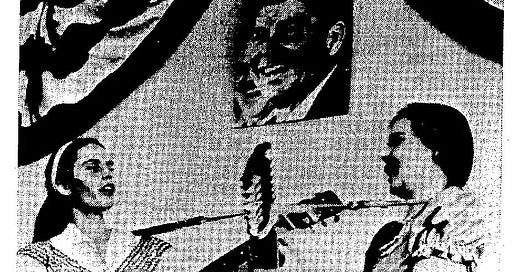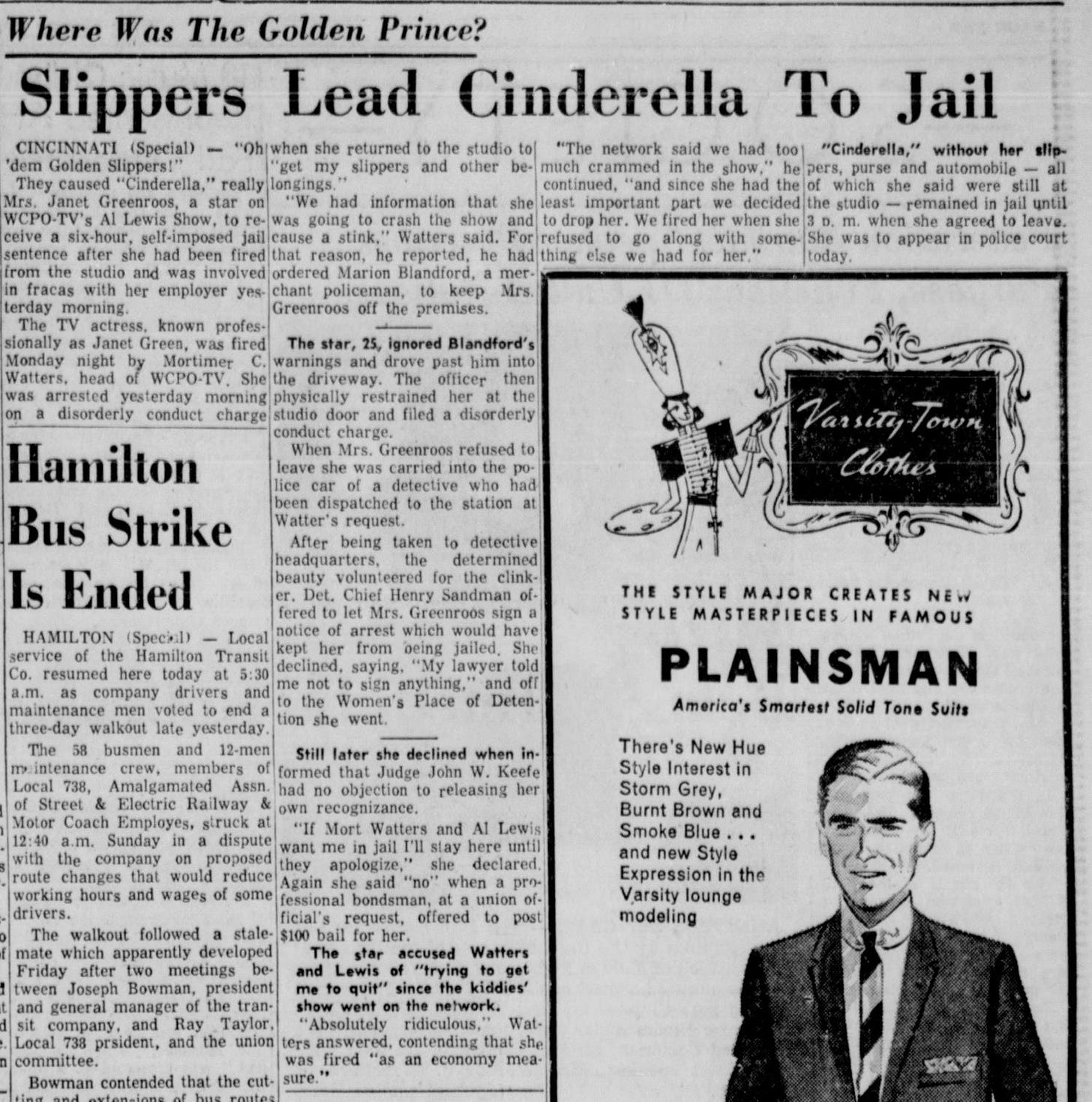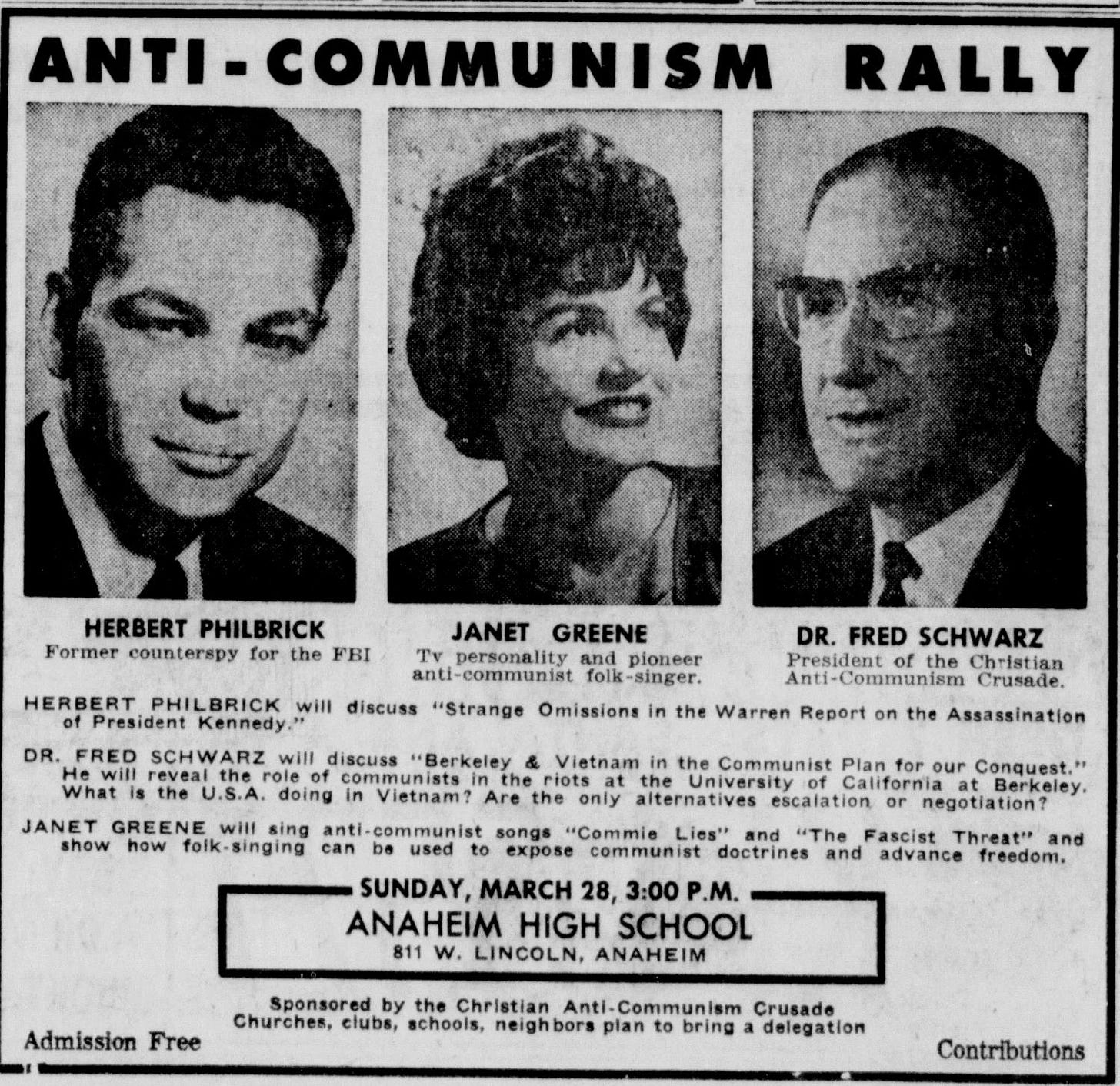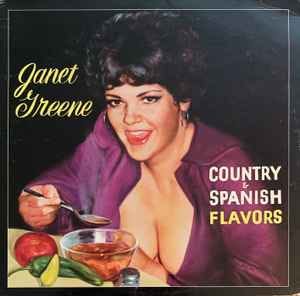On July 26, 1964, the final night of that year’s Newport Folk Festival, Bob Dylan's performance featured a number of songs from his album Another Side of Bob Dylan, recorded just a month earlier and released a couple of weeks later. The album marked a pivot from the “finger-pointing” protest songs of his previous albums, which had marked the peak of popularity of the two decades-old American folk music revival.
Folk singer Joan Baez joined Dylan for the last number, duetting on “With God on Our Side,” a song he had recorded a year earlier for his The Times They Are-A Changin’ and she included in Joan Baez in Concert, Part 2, released in November 1963, possibly the same day that President John F. Kennedy was assassinated (the formative pop rock albums A Christmas Gift for You from Phil Spector and With the Beatles were also released that day).
The song’s lyrics criticize the belief that God will always support their side and oppose those with whom they disagree, thus leading to an unchallenged acceptance of the morality behind war waged and brutality committed by one’s country.
“But now we've got weapons of the chemical dust
If fire them we're forced to, then fire them we must
One push of the button and a shot the world wide
And you never ask questions when God's on your side”
According to Wikipedia, U.S. Army Officer Anthony B. Herbert claimed in an interview that while serving during the Vietnam War, a general asked him to stop playing a record of Baez’s cover of “With God on Our Side” because he said she was “anti-military.”
In May 2007, Baez was banned from performing at a concert for wounded soldiers at Walter Reed Army Medical Center after she had been invited to play there by musician John Mellencamp, whose management was told, “She can’t fit here, period.”
Ten days before Dylan’s Newport performance, Senator Barry Goldwater of Arizona was voted as the party’s nominee for President of the United States at the Republican National Convention held at the Cow Palace in Daly City, California.
In an effort to support Goldwater’s presidential campaign, four teenage college students from Nashville formed the folk singing group, the Goldwaters, and released the album The Goldwaters Sing Folk Songs to Bug the Liberals.
The group joined Goldwater on the campaign trail, playing at his appearances, and wearing sweaters adorned with the combined formulas for gold and water (Au H2O) and played songs such as “What Have You Done,” “Win In ‘64,” and “Down in Havana.”
Two years after Joseph McCarthy’s Wheeling, West Virginia speech that kicked off “McCarthyism” during the second Red Scare, the non-profit Christian Anti-Communism Crusade (CACC) was founded in 1953 (the same year Josef Stalin died) with headquarters in Iowa, then Long Beach, California. The CACC’s executive director was Australian-born-and-raised Dr. Frederick C. Schwarz.
During his time with the CACC, Schwarz gave lectures and seminars on communism across the country, broadcast television programs on the subject on the west coast and received financial support for his anticommunist rallies rom Walter Knott, founder of Knott’s Berry Farm and member of the John Birch Society, and Patrick Frawley, a Wall Street tycoon who owned shares of Schick, Technicolor, and sold Paper Mate to Gilette. Knott and Frawley also donated money to Goldwater’s campaign.
Janet Greenroos, who was born Janet Marcum and whose stage name was Janet Greene, was a local singer and star on WCPO-TV’s “Al Lewis Show” in Cincinnati playing Cinderella when she was suddenly fired in 1958 by station head Mort Watters.
When she returned to the station to get her belongings, she was arrested on the charge of disorderly conduct.
“We had information that she was going to crash the show and cause a stink,” Watters said.
“If Mort Watters and Al Lewis want me in jail, I’ll stay here until they apologize,” Greene said.
She finally agreed to leave later in the afternoon. Her case went to trial, and she was acquitted three months after the incident.
Watters was inducted into the Greater Cincinnati Broadcast Hall of Fame in 1990.
Greene and her husband, who she married at 17, moved to Columbus where she created her own Cinderella program on WTVN, and performed with the Columbus Symphony Orchestra.
In 1964, she and her husband attended Schwarz’s anti-communist meetings and were swayed by his lectures on communism’s evils.
Schwarz was aware of the American folk scene and its connection to progressive activism. So, when he discovered Greene was a singer, he saw her as a folk singing antidote to what Baez, Dylan, and Pete Seeger were serving. He paid to move Greene and her husband to Long Beach, California, and invited her to perform at his rallies, including an election rally for Goldwater alongside John Wayne and Ronald Reagan at Knott’s Berry Farm on May 30, 1964, weeks before the RNC.
Greene resigned from WTVN stating:
“Our American heritage and Christian religion are in great jeopardy. The enemy is Communism. Communism denies the existence of God, the individual right to freedom of choice and woman's right to raise her own family as God intended… I am hoping and praying that the women of the United States will become aroused and save our country and our children from the tyranny of Communism. I am dedicating my voice and musical talents to help bring this to pass.”
In a news conference at the Biltmore Hotel in October 1964, Greene was introduced by Schwarz and FBI-sanctioned-Communist-Party-infiltrator Herb Philbrick, who said, “You’d be amazed at how much doctrine can be taught in one song.”
Schwarz named Greene the Musical Director for the CACC and referred to her as the “anti-Baez” (though Greene reportedly saw a Baez concert and said she was a “wonderful artist”).
She recorded eight of her songs in 1966 at a studio owned and operated by Del Kacher, the inventor of the wah-wah pedal, and the songs were released as singles on Schwarz’s own Chantico label. The sides included “Commie Lies,” “Fascist Threat,” “Comrade’s Lament,” and “Poor Left Winger.” Are the songs satirical, sincere, or a little of both? “Commie Lies” were essentially Schwarz’s lessons set to music.
In 1967, Tony Dolan, future Pulitzer Prize-winning journalist and speechwriter for President Ronald Reagan, released the album Cry, The Beloved Country (Key Records), an album of conservative folk songs, including “Abolish! Abolish!” and “Cuba Will Be Free.” Peter McCann plays guitar on the album. This may be the same Peter McCann who had the minor hit in 1977 “Do You Wanna Make Love” and wrote singles for Jennifer Warnes and Buck Owens. Conservative writer and television host William F. Buckley wrote the liner notes. And Goldwater makes an appearance with the spoken word interlude of the title track.
Dolan was once decked backstage by actor Mark Frechette (Zabriskie Point) at a taping of “The Merv Griffin Show.” “You don’t hit very hard,” Dolan responded. Abbie Hoffman was booked on the same show.
Singer Vera Vanderlaan released Torch of Freedom (Vanco), an album of right-wing folk songs in 1968, including “The Redcoats Come!” “Don’t Bite the Hand That’s Feeding You” and “Freedom Is a Hammer.” Some of the songs appeared on her EP Songs of Freedom released in 1965. One of her songs would later be covered by Tiny Tim.
In October 1967, Vanderlaan and fellow singer Bunny Hop opened up a Reagan for President office in New Hampshire without Reagan’s authorization.
But the conservative folk movement, such as it was, basically stops there.
By late 1967, tensions between Schwarz and Greene's husband David Greenroos caused them to end their involvement with the CACC. Greene played supper club gigs in Southern California and Vegas. She and David divorced in 1977, and she began a romance with Spanish painter Jose Nieto until he died in 1984.
Greene released the album Country and Spanish Flavors in 1980, featuring covers of country classics, a song translated into Spanish by Nieto, and the Spanish-language standards “Amapola” and “Cu Cu Ru Paloma,” the latter of which closes her album and which was once covered in 1957 by folk singer and progressive activist Harry Belafonte and, in 1974, recorded for an album by Joan Baez.








